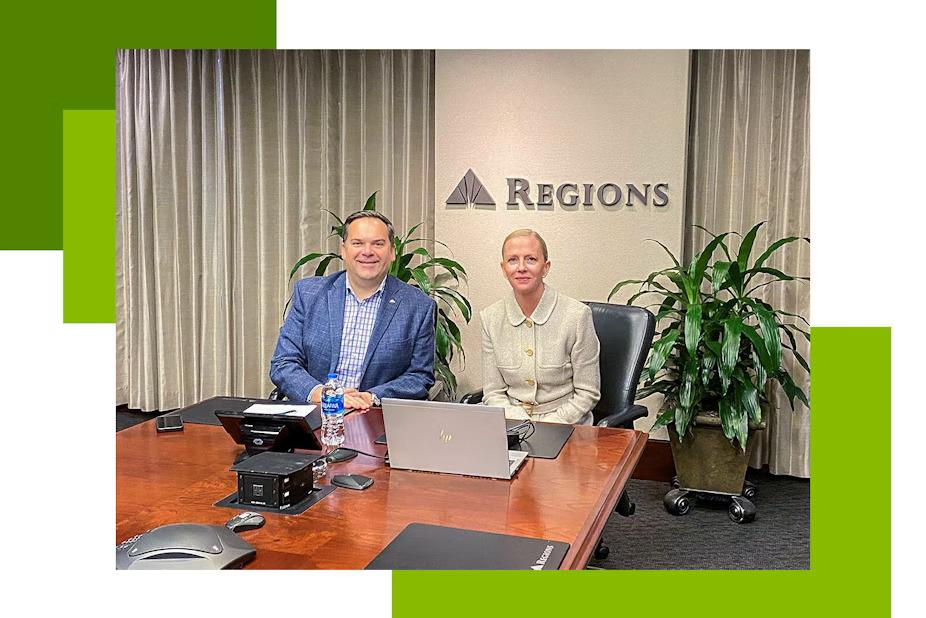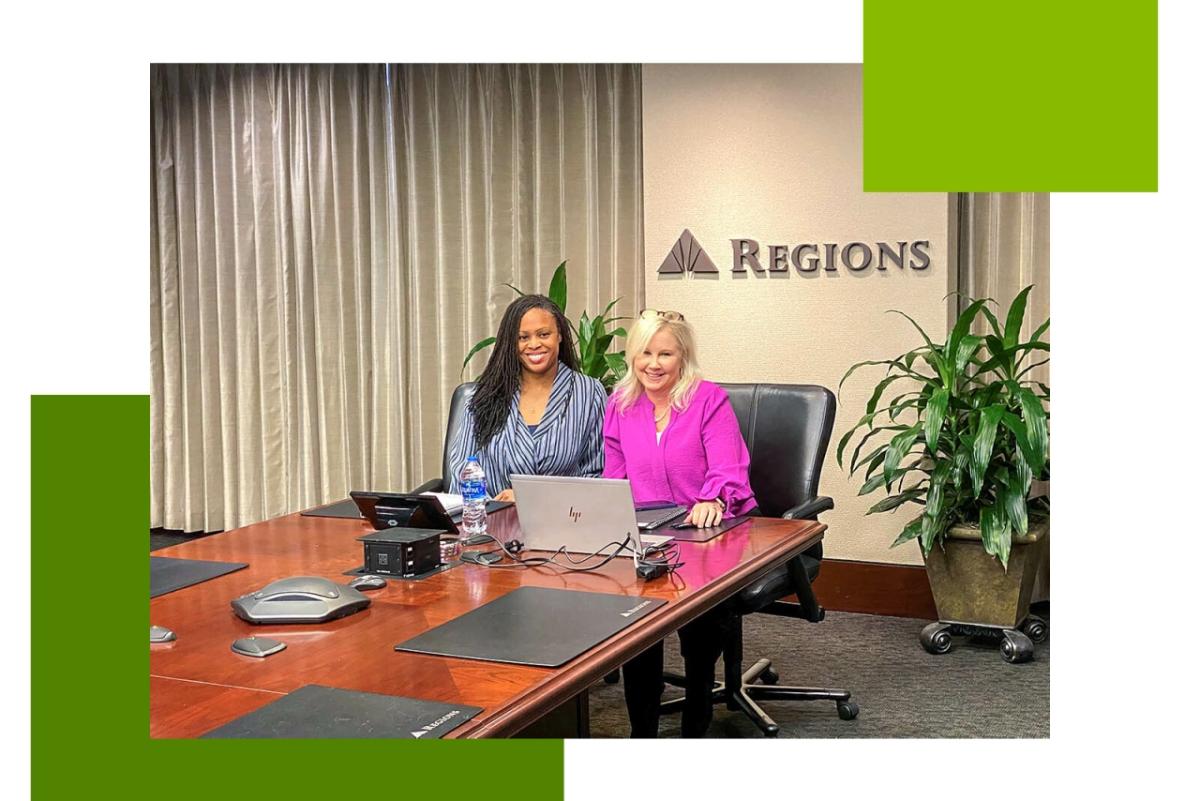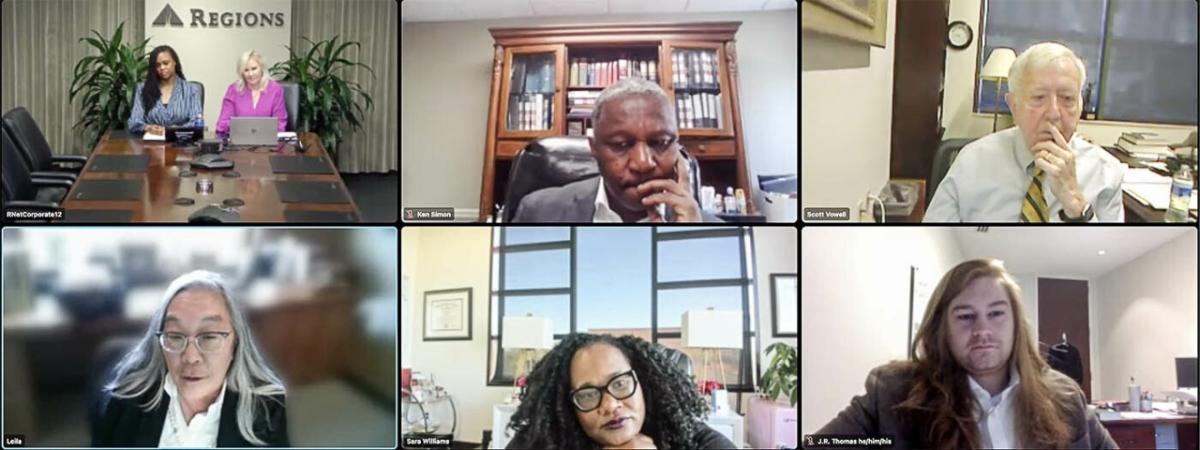The Role of Storytelling in Building Inclusion
Regions' Legal department hosted a webinar featuring five Birmingham attorneys who shared their personal diversity, equity and inclusion journeys.
By Candace Higginbotham
In his opening remarks for the fourth installment of the Birmingham Legal Leaders DEI series, Regions Chief Governance Officer Andrew Nix referenced a Harvard Business Review article about how sharing our stories builds inclusion.
Nix shared a portion of the article that set the tone for this webinar, which is part four in a series whose purpose is to further diversity, equity and inclusion, or DEI, in the local legal community.
“When people hear stories that feel representative, it creates a vehicle for nuanced conversations, which are what truly drive change. Stories invite perspective-taking: the concept of standing in someone else’s shoes and imagining what it’s like to be them. It’s a drastically underutilized inclusion tool.”
That appropriately laid the groundwork for a fascinating conversation among five Birmingham attorneys who shared their personal stories about vastly different experiences growing up and entering the legal profession in Alabama. Those experiences impact their work every day and will leave a legacy for the lawyers of the future.
Stories invite perspective-taking: the concept of standing in someone else’s shoes and imagining what it’s like to be them. It’s a drastically underutilized inclusion tool.
Harvard Business Review
Participants included former judge Ken Simon, founder of Ken Simon Law; retired judge Scott Vowell, founder of Vowell & Associates, LLC; Leila Watson, principal at Cory Watson Attorneys; Sara Williams, trial attorney at Alexander Shunnarah Trial Attorneys; and J.R. Thomas, an associate at Gregory Fann, LLC.
The Birmingham Legal Leaders DEI series was created by Regions Chief Legal Officer and Corporate Secretary Tara Plimpton and executed by the legal department’s Culture and Equity team, led by Nix.
Thursday’s virtual presentation was kicked off by Plimpton, who provided some history and context for the DEI series. “Everyone attending this seminar understands the value of diversity, equity and inclusion – and how diverse talent in an organization enables critical thinking and diversity of thought.”
Plimpton and Nix turned the meeting over to moderators Shayla Fletcher and Kristi Dowdy, members of the Regions legal department. Fletcher and Dowdy encouraged the attorneys – who together have 161 years of legal experience – to share the moments that have shaped their world view and how the legacy they inherited impacts their work.
Vowell led the conversation, and with 61 years of law practice in Alabama, he had much to say about the degree of change in law and society during his storied career. He grew up in segregated Anniston, Alabama, and as he recalled, “I never sat in the classroom with a person of color until after I graduated law school at the University of Virginia.”
He highlighted events he observed as a young lawyer in Birmingham that raised his social consciousness, including Dr. Martin Luther King’s “Birmingham revolution,” the 16th Street Baptist Church bombing in 1963, and the passage of the Voting Rights Act of 1965.
“On Monday mornings the waiting room of our law office was full of people who had been beaten up by Bull Connor’s policemen,” he recalled. “It didn’t take me long to realize changes needed to be made. I don’t see how anybody who saw what I saw in those days wouldn’t do what they could to change it.”
Simon, on the other hand, was born in 1954, the year that the United States Supreme Court ended school segregation in Brown v. Board of Education. Simon grew up during the Civil Rights era in a low-income housing project in Mobile, Alabama. He recalled seeing Governor George Wallace on television giving his 1963 inaugural speech.
“When the governor of your state is talking about segregation now, segregation tomorrow, segregation forever – and the entire legislature stands up and cheers – you hear that message and you’re part of a segregated community, you think ‘what is it going to take to change?’”
Simon’s grandfather’s home in Mobile was across the street from a law firm. As a boy he watched closely and recognized their leadership in the community, especially in the area of civil rights. He decided then he wanted to be a lawyer and a change agent.
Watson, who is third-generation Japanese American, grew up in Pennsylvania with a father who taught his children to fight and protect one another against the prejudices they endured. And they did.
She begrudgingly accepted a position in Birmingham after graduating from Maryland Law School in 1983. “I hated the thought of it, but it turned out to be a delight,” she said. “Birmingham was shockingly segregated even in the ‘80s but I have always been treated well – until the COVID-19 pandemic.”
She spoke about taking on leadership roles in local and state bar associations and the importance of having female minorities in these positions. “You can’t build a platform if you’re not present,” she said.
Williams, who grew up in a military family, lived all over the world and had a very diverse upbringing. Then she chose to go to Cumberland School of Law in Birmingham, which she described as “the whitest private law school in the country.” But the irony is that law school was a very transformative experience for her. “I developed my sense of self there,” she said.
She learned to be comfortable being herself and not shy away from being a strong woman. Williams recalled her experiences throughout her career of being “the only” and reconciling that. “I was hired because I was a good trial lawyer and my diversity was a bonus,” she said. “A law firm is not going to hire you if you don’t have skills.”
Thomas, the youngest attorney in the group, has been practicing since 2019. He is active in the National LGBTQ+ Bar Association and talked about the opportunity that state and local bar associations have to reach out to this segment of the legal community. “In my family law work, I deal with a lot of LGBTQ+ children’s issues, and more support in this area would be very helpful.”
After explaining how their personal stories have shaped their careers and their positions on DEI issues, the participants were asked about obstacles they see to achieving greater equity. Vowell spoke at length about the lack of racial diversity on the judicial bench and how the current method of electing judges is perpetuating the problem. “People have to see people that look like them on the bench,” he said.
Simon agreed and added that a lack of diversity on the plaintiff side is also an issue, as well as business development for Black lawyers. He encouraged minority attorneys to be change agents. “Through leadership, advocacy and nonprofit work, we can play a big role in making our communities better,” he said.
The racial inequities tied to death penalty laws are an important issue for Watson. She echoed the need for community involvement, saying, “All lawyers were trained to advocate for someone other than themselves. We should all be doing pro bono work for people who can least afford a lawyer.” She also emphasized the importance of mentorship, which is “very rewarding and important – worth the effort.”
The discussion was very impactful for the audience, as indicated by the positive feedback immediately forwarded at the close of the meeting.
“I think having that group of lawyers tell their stories is a great way to communicate our history, our issues and how and why we need to continue to push for progress,” said a viewer from a large Birmingham firm.
Another local attorney said, “This program provided inspiration and profound lessons. One of those is that, while none of us single-handedly can change our society, each of us can help to move our culture in the right direction.”
The Regions Legal team was also pleased with the discussion and looks forward to building on the success of these four webinars. Fletcher teased a new format that’s in the works, saying, “We’re contemplating new and different ways to take meaningful strides toward greater equity in the community. The Birmingham Legal Leaders programming may look different in the future but we’re not done yet!”




